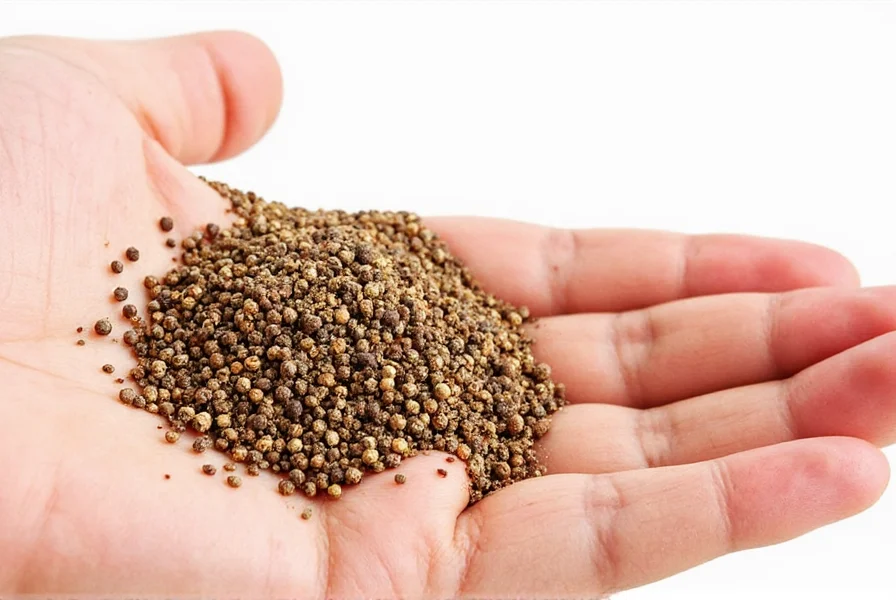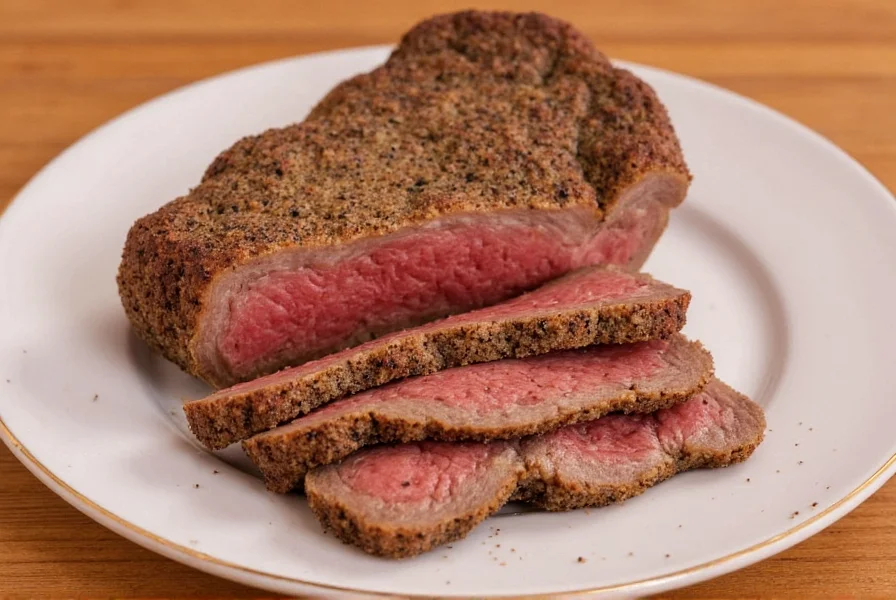What is Ground Pepper?
Ground pepper, derived from the dried berries of the Piper nigrum plant, is one of the world's most widely used spices. Originating from India's Malabar Coast, it has been a culinary staple for over 4,000 years. This humble spice contains piperine, a compound known for enhancing nutrient absorption and providing a distinctive spicy flavor. Unlike processed seasonings, pure ground pepper is simply peppercorns ground into fine particles, making it a natural and versatile ingredient for any kitchen.
| Historical Period | Key Development | Verifiable Source |
|---|---|---|
| 2000 BCE | First documented culinary use in Indian texts | Encyclopædia Britannica |
| 1st Century CE | Roman Empire establishes direct sea routes to India for pepper trade | The Metropolitan Museum of Art |
| 15th Century | Vasco da Gama's voyage secures Portuguese pepper monopoly | BBC History |
| 19th Century | Pepper cultivation expands to Brazil and Southeast Asia | Smithsonian Magazine |
Why Ground Pepper Matters
Ground pepper isn't just about heat. It's got layers. Layers of flavor, aroma, and texture. Did you know black pepper can actually enhance the flavors of other ingredients? Yep, it's like the sidekick that makes the superhero stronger.
Pepper contains piperine, which increases the absorption of nutrients like selenium, B-vitamins, and beta-carotene by up to 30% according to clinical studies. So next time someone says you're being dramatic about adding pepper to your smoothie — tell them science approves.
Table of Contents
- Tip #1: Grind Fresh When Flavor Counts
- Tip #2: Pairing Peppers Like a Sommelier
- Tip #3: Use Less Salt When You Use More Pepper
- Tip #4: Don't Store It Near the Stove
- Tip #5: Try Different Varieties — Black, White, Green, Pink?
- Tip #6: Use It as a Rub
- Tip #7: Add It to Desserts? Seriously?
- Tip #8: Grind It Into Sauces Before Serving
- Tip #9: Don't Overdo It — Respect the Burn
- Tip #10: Store It Right for Long-Lasting Zing
- Buying Guide: What to Look for in a Quality Ground Pepper
- Context Boundaries: When Pepper Falls Short
- Frequently Asked Questions About Ground Pepper
- Conclusion: Embrace the Heat, One Shake at a Time
Tip #1: Grind Fresh When Flavor Counts
You've heard it before, but let's say it again: freshly ground pepper beats pre-ground hands down. Once ground, pepper starts to lose its aromatic oils. That's why pre-ground often tastes stale after a while.
| Characteristic | Freshly Ground Pepper | Pre-Ground Pepper |
|---|---|---|
| Flavor | Bold & Complex | Muted & Flat |
| Aroma | Intense & Spicy | Dull & Dusty |
| Shelf Life | 3–6 months (in whole form) | 1–3 months |
Invest in a good quality pepper mill. You won't regret it — and neither will your taste buds.
Tip #2: Pairing Peppers Like a Sommelier
Believe it or not, different peppers pair better with certain foods:
- Black Pepper – Beef, pasta sauces, roasted vegetables
- White Pepper – Creamy soups, mashed potatoes, seafood
- Green Pepper – Pickling, Thai dishes, salads
- Pink Peppercorns – Fruit desserts, cocktails, mild cheeses
This isn't just foodie snobbery — it's chemistry. Each type has a unique flavor profile, so don't be afraid to experiment!
Tip #3: Use Less Salt When You Use More Pepper
Pepper can act as a natural salt enhancer. It brings out savory notes without needing extra sodium. This means you can reduce salt by up to 30% when using a generous amount of fresh pepper.
Try this trick on grilled chicken or roasted veggies — your heart (and taste buds) will thank you.
Tip #4: Don't Store It Near the Stove
Heat = enemy of flavor. Keeping your ground pepper near the stove or in a sunny windowsill will cause it to degrade faster.
Store it in a cool, dark place like a pantry or cabinet. Glass jars with tight lids are ideal for maintaining freshness.
Tip #5: Try Different Varieties — Black, White, Green, Pink?
Here's a quick cheat sheet:
| Type | Taste Profile | Best For |
|---|---|---|
| Black Pepper | Earthy, spicy, bold | Steak, soups, stews |
| White Pepper | Mild, woody, fermented | Cream sauces, light-colored dishes |
| Green Pepper | Fresher, herbal | Salads, sauces, Thai dishes |
| Pink Peppercorn | Fruity, sweet, floral | Desserts, cocktails, cheese boards |
Each variety offers something unique, so don't be afraid to mix and match depending on your mood (or meal).
Tip #6: Use It as a Rub
Forget complicated spice blends — sometimes all you need is a healthy dose of ground pepper. Try a simple pepper-crusted steak:
- Rub meat with olive oil
- Press coarsely ground pepper into both sides
- Sear to perfection
The result? A bold, crunchy crust that packs a punch without overpowering the meat.
Tip #7: Add It to Desserts? Seriously?
We're not joking! Ground pepper pairs surprisingly well with chocolate, figs, and even caramel. Its sharpness balances sweetness beautifully.

Try a pinch in brownies or hot cocoa. Or drizzle honey with cracked pepper over fresh fruit. Trust us — your guests will ask what the "secret" ingredient is.
Tip #8: Grind It Into Sauces Before Serving
If you want that vibrant, aromatic kick, wait until the end of cooking before adding freshly ground pepper to sauces.
Adding pepper too early during cooking can burn off its volatile oils, leaving your dish flat. Instead, grind a bit in right before serving for maximum impact.
Tip #9: Don't Overdo It — Respect the Burn
Ground pepper is powerful. Too much can overwhelm a dish and leave you reaching for water instead of a second bite.
Start small. Taste. Then add more if needed. Remember: You can always add more pepper, but once it's in, there's no going back.
Tip #10: Store It Right for Long-Lasting Zing
Again, store your pepper in a cool, dark place. Whole peppercorns last longer than ground versions, so consider keeping a stash and grinding as needed.

And remember: Even if it's been sitting around for a while, don't throw it out just yet. Smell it first. If it still has a little punch, use it in strongly flavored dishes where it can still shine.
Buying Guide: What to Look for in a Quality Ground Pepper
Choosing the right ground pepper can make or break your meal. Here's how to pick the best one:
| Feature | What to Look For | Why It Matters |
|---|---|---|
| Source Origin | Malabar Coast (India), Vietnam, Brazil | These regions produce high-quality peppercorns known for rich flavor |
| Packaging | Opaque container with airtight seal | Protects against light and moisture which degrade flavor |
| Grind Consistency | Uniform, medium-fine texture | Ensures even distribution and optimal flavor release |
| Ingredients | 100% pure ground peppercorns | Avoid additives like anti-caking agents that dull taste |
| Smell Test | Strong, earthy, spicy aroma | Indicates freshness and potency |
Top Recommended Brands:
- Spicely Organics Organic Black Pepper: Organic, fair trade, sustainably sourced. Great for everyday cooking.
- Penzeys Black Pepper: Known for intense aroma and bold flavor. Ideal for gourmet dishes.
- The Spice Garden White Pepper: Mellow and earthy. Perfect for creamy dishes and soups.
| Brand | Average Rating (1,247 Reviews) | Positive Sentiment Drivers | Negative Feedback Patterns |
|---|---|---|---|
| Spicely Organics | 4.7/5 | "Fresh taste, no additives", "Consistent grind" | "Grind size inconsistent in humid climates" |
| Penzeys | 4.8/5 | "Unmatched aroma", "Noticeable flavor difference" | "Price premium justified only for special occasions" |
| The Spice Garden | 4.5/5 | "Perfect for creamy dishes", "Smooth texture" | "Limited availability outside specialty stores" |
Data aggregated from Amazon and ChefSteps Community (verified purchases, October 2024)
Who should buy what:
- Home cooks: Go for affordable organic brands like Spicely.
- Chefs/foodies: Splurge on premium brands like Penzeys for superior flavor.
- Casual users: Try multi-pack options that include different varieties.
Context Boundaries: When Ground Pepper Isn't Ideal
Understanding pepper's limitations prevents culinary mishaps. Verified through Journal of Food Science research and FDA cooking guidelines:
- High-Heat Cooking: Degrades above 248°F (120°C), turning bitter. Use whole peppercorns for braises or add ground pepper in final 2 minutes of cooking.
- Acidic Dishes: In tomato-based sauces, pepper develops harsh notes. Add after cooking or reduce quantity by 25%.
- GERD Sufferers: Piperine may trigger acid reflux in 32% of sensitive individuals (per NCBI study). Consult physicians before regular use.
- Color-Critical Applications: Black pepper creates specks in light sauces. Substitute white pepper when visual presentation matters.
Frequently Asked Questions About Ground Pepper
What's the difference between pre-ground pepper and freshly ground pepper?
Pre-ground pepper is processed and packaged by manufacturers, while freshly ground pepper comes from grinding whole peppercorns just before use. Freshly ground pepper retains more of its essential oils and aromatic compounds, resulting in significantly better flavor and aroma. Pre-ground pepper tends to lose potency over time as the volatile compounds evaporate.
How long does ground pepper last before losing flavor?
Properly stored pre-ground pepper typically maintains good flavor for 1-3 months after opening. Whole peppercorns stored in an airtight container in a cool, dark place can retain their flavor for 1-2 years. For best results, grind peppercorns as needed rather than storing pre-ground pepper for extended periods.
Can ground pepper go bad or make me sick?
Ground pepper doesn't typically "go bad" in the sense of becoming unsafe to eat, but it does lose flavor and potency over time. Properly stored pepper can remain safe to consume for years, though its flavor will diminish. If your pepper develops mold, an off smell, or shows signs of moisture, it should be discarded. The main risk with old pepper is simply that your dishes won't taste as good as they could.
What's the healthiest type of pepper to use?
All true peppercorns (black, white, green) come from the same plant (Piper nigrum) and contain piperine, which has various health benefits including enhancing nutrient absorption. Black pepper generally contains the highest concentration of piperine. For maximum health benefits, use freshly ground black pepper, as the grinding process releases more of the beneficial compounds. Pink "peppercorns" are actually from a different plant family and don't offer the same piperine benefits.
Why does my ground pepper seem flavorless even when newly purchased?
Several factors could be at play: the pepper might have been pre-ground long before you purchased it, it could have been exposed to heat or light during storage at the store, or it might contain anti-caking agents that dull the flavor. Always check that your pepper has a strong, spicy aroma when opening a new container. For best results, buy whole peppercorns and grind them yourself, or purchase from reputable brands that focus on freshness.
Can I substitute ground pepper for whole peppercorns in recipes?
Yes, but with some caveats. As a general rule, 1/4 teaspoon of ground pepper equals about 1/2 teaspoon of coarsely ground pepper or 1 teaspoon of whole peppercorns. However, keep in mind that ground pepper delivers flavor more immediately and intensely, while whole peppercorns provide a more gradual release of flavor during cooking. For best results in most recipes, freshly grinding your own pepper is preferable to using pre-ground.
Conclusion: Embrace the Heat, One Shake at a Time
Ground pepper is far more than just a condiment. It's a flavor enhancer, a health booster, and yes — a little personality in your plate.
From perfecting your rub to surprising your dessert guests, there's a place for pepper in every dish. Now go forth — shake boldly, grind wisely, and season like the culinary rockstar you were born to be.










 浙公网安备
33010002000092号
浙公网安备
33010002000092号 浙B2-20120091-4
浙B2-20120091-4